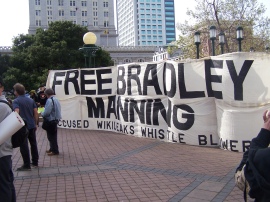Yesterday began the court martial hearings for Private First Class Bradley Manning, the 25 year old US Army soldier charged with sharing sensitive military and diplomatic documents with activist whistle-blower website WikiLeaks. Manning has plead guilty to charges of misuse of classified information, though he has maintained a not guilty plea regarding charges of aiding the enemy.
The document leak included nearly a quarter million cables which revealed a number of previously secret military incidents and accounts of a variety of shady and potentially criminal back room political dealings with foreign governments. As Manning himself explained yesterday, his motivation to release these documents for public consumption stemmed from a desire to invite the public into a discussion about the US’s foreign policy, which, under the Obama administration, has been all but opaque (despite promises of increased transparency). For Manning, what he saw during his service left him with a moral duty to make a difference.

The fact is, while Manning may be a “criminal” in that he breached confidentiality and went against the expectations of his station, he is a hero first and foremost. Bradly Manning is a man who saw something less than honorable happening and felt a duty as a servant, not of his commanding officer nor President Obama, but of the United States and its citizens, to do something about it. Without a doubt he knew he would face public denigration and a court martial but saw it as a worthwhile price to pay. Though it is hard to say whether he knew he’d be in for nearly three years of solitary confinement and harassment techniques many (including the UN) would call torture, or at the least cruel and inhuman.
Surely Manning’s actions endangered American lives overseas and our War on Terror, justifying his treatment? As Manning explains, he thought carefully about which documents to release and which to withhold as it pertained to the security and safety of lives. At worst the documents, relating to events over three years ago, are an embarrassment to the Obama administration and our back-room diplomats, including revealing US dealings with terrorist-friendly nations, highly questionable military activity in Pakistan, and accounts of Chinese hacking campaigns, among the list of quite varied leaks (this is just a brief overview of some of them). Though I am not exactly privy to military intelligence, it remains to be seen that Manning’s leaks put any soldiers directly in harm’s way.
Looking at his statements about his motivations and how he arrived to his decision, it’s clear this is where Manning stands out and separates himself from the rest of the military and Obama’s foreign policy – he’s not concerned just about American lives, but all lives. What he saw during his time in the Army, as he explains, lead him to become “depressed about the situation” in Afghanistan and Iraq seeing the military campaigns there to be anything but righteous. He believed that the “ground reality” of the wars were not being conveyed accurately or honestly to the public and believed that releasing the damning documents could start a productive, public conversation on US foreign policy.
So what’s next for Manning? Though the court martial has not yet been concluded, it’s looking very likely that he will be facing a dishonorable discharge and at least twenty years of prison time. But is this justice? It is tragic that this is how we treat individuals whose duty as a member of the military extends beyond following the direct orders of his commander, but to our nation and its people.
While certainly few would say that there does not need to be at least some military information which should probably remain classified for safety reasons, the extreme lack of transparency present in our foreign policy is dishonest at best and dangerous at worst and has nothing to do with safety. These conflicts and their perpetuation are only made possible by those who foot the bill – American taxpayers like us – and our approval of these actions. The individuals in D.C. are only in the position they’re in because you put them there, and stay there because you approve of their work. When, as a voter, you are restricted from seeing the whole picture, it becomes common for less than favorable things to happen – things Americans may not want to see their tax dollars spent on.
Regardless of your stance on the US’s foreign policy, we should be asking ourselves what is wrong with this picture when huge amounts of information government and military are routinely hiding from the public (unsettling in its own right) is brought to the fore by a courageous individual and his reward is three years of near total solitary isolation and calls for his execution. Bradley did what very few people in his position would have, answering to his own sense of right and wrong instead of deferring responsibility and decision making to his superior officer. Bradley Manning believed that American taxpayers and voters had a right to know what was being done in their name with little to no accountability to the public.
And for that many Americans like myself will remember Bradley Manning as the hero he is.

Pingback: State of the Blog (and the future) — 3/2 | the subjectiv